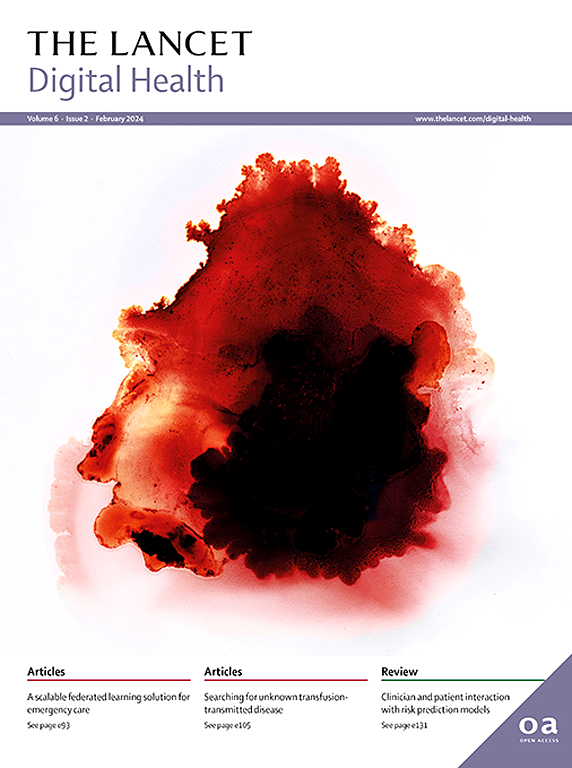通过移动医疗技术进行家庭心脏康复干预的有效性:系统回顾和荟萃分析。
IF 23.8
1区 医学
Q1 MEDICAL INFORMATICS
引用次数: 0
摘要
背景:由于转诊率低、可及性障碍和社会经济限制,以中心为基础的心脏康复(CBCR)未得到充分利用。移动医疗技术有可能通过远程提供家庭心脏康复(HBCR)来解决其中的一些挑战。本研究旨在评估与常规护理和CBCR相比,移动健康HBCR干预对心脏病患者的影响。方法:我们对移动医疗HBCR干预的随机对照试验进行了系统回顾和荟萃分析。四个电子数据库(MEDLINE, CENTRAL, CINAHL和Embase)从创刊到2023年3月31日进行检索,没有语言和出版物类型限制。符合条件的研究是针对成年心脏病患者(年龄≥18岁)的随机对照试验,将移动健康干预与常规护理或CBCR进行比较。主要结果是有氧运动能力,通过VO2峰值或6分钟步行测试(6MWT)进行评估。使用GRADE系统评估证据质量。本综述注册号为PROSPERO,编号为CRD42024544087。结果:我们检索到9164篇文献,其中135篇被保留作全文审阅。13项随机对照试验符合入选标准,纳入系统评价,涉及1508例心肌梗死、心绞痛、心力衰竭或接受过血运重建术的成年人。干预时间为6周至24周。随机效应荟萃分析显示,与常规护理相比,移动医疗的HBCR显著改善了6MWT(平均差异24.74,95% CI 9.88 - 39.60;532例)和VO2峰值(1.77,1.19 -2·35;359名患者)。mHealth的HBCR和CBCR之间没有发现显著差异。由于偏倚和不精确(小样本量)的风险,各个结果的证据质量从低到非常低。解释:移动健康HBCR可以改善无法参加CBCR的患者的可及性和健康结果。需要进一步的研究来建立关于移动医疗HBCR的临床效果和成本效益的强有力的证据基础,特别是与CBCR进行比较,以便为临床实践和政策提供信息。资金:没有。本文章由计算机程序翻译,如有差异,请以英文原文为准。
Effectiveness of home-based cardiac rehabilitation interventions delivered via mHealth technologies: a systematic review and meta-analysis
Background
Centre-based cardiac rehabilitation (CBCR) is underused due to low referral rates, accessibility barriers, and socioeconomic constraints. mHealth technologies have the potential to address some of these challenges through remote delivery of home-based cardiac rehabilitation (HBCR). This study aims to assess the effects of mHealth HBCR interventions compared with usual care and CBCR in patients with heart disease.
Methods
We conducted a systematic review and meta-analysis of randomised controlled trials of mHealth HBCR interventions. Four electronic databases (MEDLINE, CENTRAL, CINAHL, and Embase) were searched from inception to March 31, 2023, with no restrictions on language or publication type. Eligible studies were randomised controlled trials of adult patients (age ≥18 years) with heart disease, comparing mHealth interventions with usual care or CBCR. The primary outcome of interest was aerobic exercise capacity, assessed with VO2 peak or 6-min walk test (6MWT). Quality of evidence was assessed using the GRADE system. This review was registered with PROSPERO, CRD42024544087.
Findings
Our search yielded 9164 references, of which 135 were retained for full-text review. 13 randomised controlled trials met eligibility criteria and were included in the systematic review, involving 1508 adults with myocardial infarction, angina pectoris, or heart failure, or who had undergone revascularisation. Intervention duration ranged from 6 weeks to 24 weeks. Random-effects meta-analysis showed that, compared with usual care, mHealth HBCR significantly improved 6MWT (mean difference 24·74, 95% CI 9·88–39·60; 532 patients) and VO2 peak (1·77, 1·19–2·35; 359 patients). No significant differences were found between mHealth HBCR and CBCR. Quality of evidence ranged from low to very low across outcomes due to risk of bias and imprecision (small sample size).
Interpretation
mHealth HBCR could improve access and health outcomes in patients who are unable to attend CBCR. Further research is needed to build a robust evidence base on the clinical effectiveness and cost-effectiveness of mHealth HBCR, particularly in comparison with CBCR, to inform clinical practice and policy.
Funding
None.
求助全文
通过发布文献求助,成功后即可免费获取论文全文。
去求助
来源期刊

Lancet Digital Health
Multiple-
CiteScore
41.20
自引率
1.60%
发文量
232
审稿时长
13 weeks
期刊介绍:
The Lancet Digital Health publishes important, innovative, and practice-changing research on any topic connected with digital technology in clinical medicine, public health, and global health.
The journal’s open access content crosses subject boundaries, building bridges between health professionals and researchers.By bringing together the most important advances in this multidisciplinary field,The Lancet Digital Health is the most prominent publishing venue in digital health.
We publish a range of content types including Articles,Review, Comment, and Correspondence, contributing to promoting digital technologies in health practice worldwide.
 求助内容:
求助内容: 应助结果提醒方式:
应助结果提醒方式:


